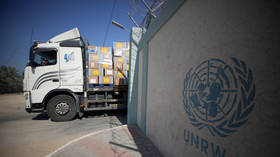UN scales back Gaza aid operation amid fuel shortage

United Nations (UN) aid organizations operating within Gaza have been forced to reduce their efforts due to a fuel shortage, the Relief and Works Agency for Palestinian Refugees in the Near East (UNRWA) said on Thursday.
On Wednesday, the UN warned that limited fuel supplies could seriously hamper aid operations in the coastal enclave, with a representative for the agency telling CNN that UNRWA “will no longer be able to work” if fuel is exhausted.
“There has to be a way to get the fuel in; otherwise, everything can stop tomorrow,” spokesperson Tamara el-Rifae told UK publication The Independent. “Or we have to make extremely hard choices.”
El-Rifae explained to the newspaper that “we will have to decide whether to direct [the remaining] fuel to generators in hospitals, or to bakeries to make bread for people’s survival or to trucks to deliver aid or to desalination plants for clean water.”
It is expected that fuel will run out on Thursday, the BBC said. Some aid has entered Gaza via Egypt, including food, water, and medical supplies. Israel has refused to permit fuel to be transported into Gaza since the October 7 attack by the Palestinian militant group Hamas, saying that the group could use it for offensive military purposes.
On Thursday, a UNRWA statement on its website said: “Fuel continues to be urgently needed to maintain vital humanitarian operations. Current stocks are almost completely exhausted, forcing life-saving services to come to a halt. This includes the supply of piped water as well as fuel for the health sector, bakeries, and generators.”
In a post to X, formerly Twitter, on Tuesday, the Israel Defense Forces (IDF) published a satellite photograph which it claims shows storage tanks containing 500,000 liters of fuel in Gaza. “Ask Hamas if you can have some,” the post said.
Palestinian officials say that more than 7,000 people – around 3,000 children – have been killed in the blockaded territory since Israel launched an unprecedented campaign of airstrikes in retaliation for the Hamas assault in Israel earlier this month. It has been reported that Gaza’s healthcare system is on the brink of collapse, with around a third of hospitals not functioning adequately and others only capable of treating emergency cases.
A minimum of 74 supply vehicles containing various humanitarian supplies – notably except fuel – have entered Gaza through Egypt from the Rafah border crossing since Saturday. Before the renewed conflict this month, 500 such trucks entered the territory daily.
“We’re the largest humanitarian organization, and we are on the verge of stopping operations,” UNWRA’s Juliette Touma told the BBC on Thursday. “All we’re asking to do is to be able to do our work.”













